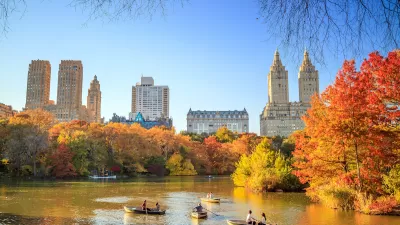The inequities of New York City’s park system have been on the policy radar since state legislation was introduced last year that would require large, wealthy park conservancies to contribute to smaller, cash-strapped parks around the city.
Following on the recent appointment of Mitchell Silver to head the New York City Parks Department, Alexandra Lange writes for The New Yorker on the problem of inequity in the parks of New York City, arguing for a solution that would establish neighborhood conservancies for local park space.
The inequity of the city’s park system is such that State Senator Daniel L. Squadron last year introduced legislation that “would take twenty per cent from the budgets of the ‘well-financed conservancies’ and redistribute it to poorer parks, matching these ‘contributing parks’ to ‘member parks.’”
Lange proposes an arrangement that goes beyond Squadron’s “tithe” by allowing all citizens of New York to have a chance to contribute to the success of their neighborhood parks: “We would leverage our inherent narcissism to do some good for our daily lives, and the lives of others. The pitch: give to the park you visit every day, rather than the one you go to a couple of times a year.”
Lange’s proposal would prevent the types of inequality Squadron’s plan is meant to mitigate by creating alliances between neighborhoods: “The solution to this problem…is to create alliances—not between conservancies but between adjacent neighborhoods across the Mayor’s ‘two cities’ divide. It would make sense, for example, to combine Cobble Hill, Carroll Gardens, and Red Hook under a single conservancy, with the donated money to be spent equally, and volunteer labor to be spread equally, among all the parks in those areas.”
As for the new Mayor de Blasio’s take on the legislation still under consideration with the state legislature: “De Blasio endorsed the bill then but stopped short of reiterating his support on Friday, instead referring to the idea as ‘creative,’ reports Lange.
FULL STORY: How to Fix New York City's Parks

Planetizen Federal Action Tracker
A weekly monitor of how Trump’s orders and actions are impacting planners and planning in America.

Restaurant Patios Were a Pandemic Win — Why Were They so Hard to Keep?
Social distancing requirements and changes in travel patterns prompted cities to pilot new uses for street and sidewalk space. Then it got complicated.

Map: Where Senate Republicans Want to Sell Your Public Lands
For public land advocates, the Senate Republicans’ proposal to sell millions of acres of public land in the West is “the biggest fight of their careers.”

Maui's Vacation Rental Debate Turns Ugly
Verbal attacks, misinformation campaigns and fistfights plague a high-stakes debate to convert thousands of vacation rentals into long-term housing.

San Francisco Suspends Traffic Calming Amidst Record Deaths
Citing “a challenging fiscal landscape,” the city will cease the program on the heels of 42 traffic deaths, including 24 pedestrians.

California Homeless Arrests, Citations Spike After Ruling
An investigation reveals that anti-homeless actions increased up to 500% after Grants Pass v. Johnson — even in cities claiming no policy change.
Urban Design for Planners 1: Software Tools
This six-course series explores essential urban design concepts using open source software and equips planners with the tools they need to participate fully in the urban design process.
Planning for Universal Design
Learn the tools for implementing Universal Design in planning regulations.
Heyer Gruel & Associates PA
JM Goldson LLC
Custer County Colorado
City of Camden Redevelopment Agency
City of Astoria
Transportation Research & Education Center (TREC) at Portland State University
Camden Redevelopment Agency
City of Claremont
Municipality of Princeton (NJ)



























